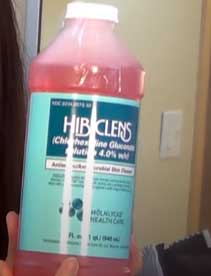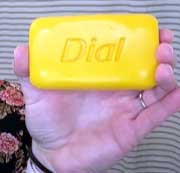I’m sure you’ve found yourself staring at the soap aisle, feeling overwhelmed by the sheer number of choices. Today, we’re going to talk about two popular options you might be considering: Hibiclens and Dial soap.
I’ve used both, and I know firsthand how hard it can be to decide which one to go with. So, I’m here to help you out with an in-depth comparison.
I’m going to break down everything you need to know about Hibiclens and Dial soap, including their pros and cons, how they compare, and which one might be the best choice for you.
By the end of this article, you’ll have a clear understanding of what each product offers and which one suits your needs best. Let’s get started!
A Brief Comparison Table
| Feature | Hibiclens | Dial Soap |
| Main Ingredient | Chlorhexidine Gluconate | Triclosan (in some variants) |
| Antibacterial | Yes | Yes (in antibacterial variants) |
| Skin Sensitivity | May cause irritation for sensitive skin | Generally gentle on skin |
| Use Cases | Pre-surgical scrubs, wound care, general hygiene | Daily hand washing, general hygiene |
| Availability | Over-the-counter, often in pharmacies | Widely available in supermarkets and stores |
| Price Range | Higher (due to medical-grade properties) | Generally lower and more affordable |
| Fragrance Options | Unscented or mildly scented | Various fragrances available |
Hibiclens: The Medical-Grade Powerhouse
Let me start with Hibiclens. This stuff is no joke. It’s a medical-grade antiseptic skin cleanser that’s often used in hospitals.
Hibiclens contains chlorhexidine gluconate, which is incredibly effective at killing a wide range of bacteria, viruses, and fungi.
It’s the go-to choice for pre-surgical scrubs and wound care.
Pros of Hibiclens

- Highly Effective Antiseptic: Hibiclens is known for its ability to kill germs quickly and effectively. This makes it a top choice for healthcare settings.
- Long-Lasting Protection: One of the standout features of Hibiclens is its ability to keep killing germs for up to 24 hours after use. This means you get prolonged protection, which is great if you’re in a high-risk environment.
- Versatile Use: While it’s often used in medical settings, you can also use Hibiclens at home. It’s great for general hygiene, especially if you’re trying to avoid infections.
Cons of Hibiclens
- Skin Sensitivity: Hibiclens can be harsh on sensitive skin. Some people experience dryness, redness, or irritation after using it. If you have sensitive skin, you might need to use it sparingly or look for a gentler option.
- Price: This isn’t your average soap, and the price reflects that. Hibiclens is more expensive than most over-the-counter soaps, which can be a downside if you’re on a budget.
- Availability: While you can find Hibiclens in many pharmacies, it’s not as widely available as Dial soap. You might need to go to a specialized store or order it online.
Dial Soap: The Everyday Hero
Now, let’s talk about Dial soap. This is a staple in many households, and for good reason.
Dial offers a range of soaps, including antibacterial options.
The main antibacterial ingredient in some Dial soaps is triclosan, which is effective at killing bacteria.
Pros of Dial Soap
- Gentle on Skin: Dial soap is generally gentle and suitable for everyday use. It’s less likely to cause irritation compared to harsher antiseptics like Hibiclens.
- Affordable: Dial soap is budget-friendly, making it an excellent choice for families and anyone looking to save money on their hygiene products.
- Variety of Options: Dial offers a wide range of soaps, including different fragrances and formulations. Whether you prefer bar soap or liquid soap, there’s a Dial product for you.
- Widely Available: You can find Dial soap in almost any supermarket or store. It’s incredibly convenient to pick up a bar or bottle whenever you need it.
Cons of Dial Soap
- Less Potent Antibacterial Action: While Dial’s antibacterial variants are effective, they’re not as powerful as Hibiclens. If you need a strong antiseptic, Dial might not be sufficient.
- Temporary Protection: Unlike Hibiclens, which offers long-lasting protection, the antibacterial effects of Dial soap are more temporary. You’ll need to wash your hands frequently to maintain protection.
- Potential for Dryness: Some users report that Dial soap can cause dryness, especially with frequent use. This is something to consider if you have dry or sensitive skin.
My Personal Experience With Hibiclens And Dial Soap
Let me share a bit about my own experience using both Hibiclens and Dial soap. I’ve found that each has its place in my routine, depending on what I need at the moment.
- Using Hibiclens
When I had a minor surgical procedure, Hibiclens was a lifesaver. The doctor recommended it for cleaning the wound area, and I felt confident knowing that it was keeping the site free from bacteria.
However, I did notice that my skin felt a bit dry after using it for a few days in a row. It wasn’t a huge issue, but it’s something to keep in mind if you have sensitive skin like mine.
- Using Dial Soap
Dial soap, on the other hand, is my go-to for everyday handwashing. I keep a bottle of the liquid antibacterial soap in my kitchen and bathrooms. It’s convenient, smells nice, and doesn’t irritate my skin. I love the variety of scents Dial offers, and it’s easy to find in any store.
Choosing The Right Soap For You
So, which one should you choose? It really depends on your needs and preferences. Here are a few scenarios to help you decide:
When to Choose Hibiclens
- Pre-Surgical Preparation: If you’re prepping for surgery or caring for a wound, Hibiclens is the way to go. Its powerful antiseptic properties are unmatched.
- High-Risk Environments: If you work in healthcare or another environment where you’re exposed to a lot of germs, Hibiclens provides superior protection.
- Infection Prevention: For anyone who needs extra protection from infections, Hibiclens is a solid choice.
When to Choose Dial Soap

- Daily Use: For everyday handwashing and general hygiene, Dial soap is perfect. It’s gentle enough for frequent use and comes in a variety of pleasant scents.
- Budget-Friendly Option: If you’re looking for an affordable soap that still offers antibacterial benefits, Dial is a great option.
- Convenience: Dial soap is easy to find and comes in many different forms, making it a convenient choice for any household.
Frequently Asked Questions (FAQs)
You can use Dial soap instead of Hibiclens for general handwashing and daily hygiene. However, for specific medical needs like pre-surgical scrubs or wound care, Hibiclens is the better choice due to its stronger antiseptic properties.
Hibiclens is a type of antibacterial soap, but it’s much more potent than regular antibacterial soaps like Dial. Hibiclens contains chlorhexidine gluconate, which provides long-lasting and powerful antiseptic action, whereas most antibacterial soaps use ingredients like triclosan or benzalkonium chloride.
Hibiclens is widely recommended as the best antibacterial soap to use before surgery. Its active ingredient, chlorhexidine gluconate, is highly effective at killing a broad spectrum of bacteria and is used in many hospitals and medical settings for pre-surgical scrubs.
The effectiveness of antibacterial soap depends on your needs. For general use, Dial antibacterial soap is effective and convenient. However, for medical-grade antiseptic needs, Hibiclens is the most effective due to its potent and long-lasting antibacterial properties.
Wrapping Up
Deciding between Hibiclens and Dial soap ultimately comes down to what you’re looking for. Hibiclens is your best bet if you need a strong antiseptic for medical purposes or high-risk environments.
On the other hand, Dial soap is a fantastic everyday option that’s gentle on the skin and easy on the wallet.
I hope this comparison has helped you understand the differences between these two soaps and which one might be the right choice for you. Whether you’re looking for daily hygiene or something more heavy-duty, there’s a soap out there that fits your needs.
So, next time you’re in the soap aisle, you’ll know exactly what to look for. Happy washing!


